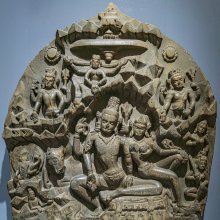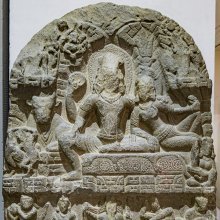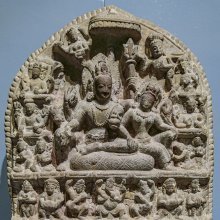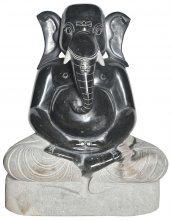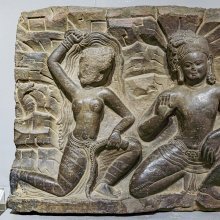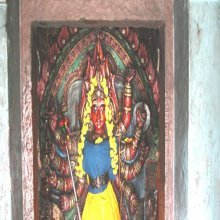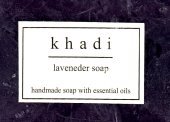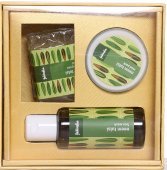Mud: 13 definitions
Introduction:
Mud means something in Hinduism, Sanskrit, Hindi, biology. If you want to know the exact meaning, history, etymology or English translation of this term then check out the descriptions on this page. Add your comment or reference to a book if you want to contribute to this summary article.
Images (photo gallery)
(+4 more images available)
In Hinduism
Vyakarana (Sanskrit grammar)
Source: Wikisource: A dictionary of Sanskrit grammarMud (मुद्).—A technical term for the sibilants श्, ष् (ś, ṣ) and स् (s) given in the Vajasaneyi-Pratisakhya; cf. मुच्च (mucca) V. Pr. I.52, cf also V. Pr. III.9,III.13,IV.122.

Vyakarana (व्याकरण, vyākaraṇa) refers to Sanskrit grammar and represents one of the six additional sciences (vedanga) to be studied along with the Vedas. Vyakarana concerns itself with the rules of Sanskrit grammar and linguistic analysis in order to establish the correct context of words and sentences.
Ayurveda (science of life)
Toxicology (Study and Treatment of poison)
Source: Shodhganga: Kasyapa Samhita—Text on Visha ChikitsaMud is used in the treatment of Maṇḍalī-snake-bites, according to the Kāśyapa Saṃhitā: an ancient Sanskrit text from the Pāñcarātra tradition dealing with both Tantra and Viṣacikitsā—an important topic from Āyurveda which deals with the study of Toxicology (Viṣavidyā or Sarpavidyā).—The Kāśyapasaṃhitā chapter 9 hint at the current trends in medication which use anti-bodies in treating poison. The Text mentions that the snake be killed, opened up and kept safely in mud. After a certain time, the mud becomes as potent as the snake. The mud , along with its bones must be powdered and kept in a vessel , made into a paste and applied to the victim bitten by Maṇḍalī snake.

Āyurveda (आयुर्वेद, ayurveda) is a branch of Indian science dealing with medicine, herbalism, taxology, anatomy, surgery, alchemy and related topics. Traditional practice of Āyurveda in ancient India dates back to at least the first millenium BC. Literature is commonly written in Sanskrit using various poetic metres.
Biology (plants and animals)
Source: Google Books: CRC World Dictionary (Regional names)Mud in Senegal is the name of a plant defined with Oncoba spinosa in various botanical sources. This page contains potential references in Ayurveda, modern medicine, and other folk traditions or local practices.
Example references for further research on medicinal uses or toxicity (see latin names for full list):
· Rhod. Agr. Journ. (1956)
· Taxon (1980)
· Wiss. Ergebn. Schwed. Rhod.–Kongo-Exped. (1914)
· For. Fl. Port. E. Afr. (1909)
· Flora Aegyptiaco-Arabica (1775)
· Journ. Linn. Soc., Bot. (1911)
If you are looking for specific details regarding Mud, for example pregnancy safety, health benefits, chemical composition, side effects, extract dosage, diet and recipes, have a look at these references.

This sections includes definitions from the five kingdoms of living things: Animals, Plants, Fungi, Protists and Monera. It will include both the official binomial nomenclature (scientific names usually in Latin) as well as regional spellings and variants.
Languages of India and abroad
Sanskrit dictionary
Source: DDSA: The practical Sanskrit-English dictionaryMud (मुद्).—I. 1 U. (modayati-te)
1) To mix, blend.
2) To cleanse, purify. -II. 1 Ā. (modate, mudita. desid. mumudiṣate or mumodiṣate) To rejoice, be glad or happy, be joyful, or delighted; यक्ष्ये दास्यामि मोदिष्य इत्यज्ञानविमोहिताः (yakṣye dāsyāmi modiṣya ityajñānavimohitāḥ) Bhagavadgītā (Bombay) 16.15; Manusmṛti 2.232;3.191; Bhaṭṭikāvya 15.97. -Caus. To please, delight, give pleasure, gratify.
--- OR ---
Mud (मुद्).—f. [mud kvap vā ṭāp] Joy, delight, pleasure, gladness, satisfaction; पितुर्मुदं तेन ततान सोऽर्भकः (piturmudaṃ tena tatāna so'rbhakaḥ) R.3.25; अश्नन् पुरो हरितको मुदमादधानः (aśnan puro haritako mudamādadhānaḥ) Śiśupālavadha 5.58;1.23; विषादे कर्तव्ये विदधति जडाः प्रत्युत मुदम् (viṣāde kartavye vidadhati jaḍāḥ pratyuta mudam) Bhartṛhari 3.25 द्विपरणमुदा (dviparaṇamudā) Gītagovinda 11; Kirātārjunīya 5.25; R.7.3; मुदे विद्यादाता प्रचुरधनदातापि न मुदे (mude vidyādātā pracuradhanadātāpi na mude) Udb.; Bhāgavata 1.12.6.
See also (synonyms): mudā.
Source: Cologne Digital Sanskrit Dictionaries: Shabda-Sagara Sanskrit-English DictionaryMuḍ (मुड्).—r. 6th cl. (muḍati) 1. To quit, to leave. 2. To clothe or cover. (i,) muḍi r. 1st cl. (muṇḍate) 1. To be pure or clean. 2. To cleanse. 3. To sink, (as in water.) 4. To sink, (in estimation.) to be despised or disregarded. (muṇḍati) 1. To shave or cut. 2. To grind or pound.
--- OR ---
Mud (मुद्).—r. 1st cl. (modate) To rejoice, to be glad. r. 10th cl. (modayati-te) 1. To mix, to blend, to unite. 2. To clean, to wipe off. With anu To allow, to permit, to approve. With ā 1. To be glad. 2. To be fragrant.
--- OR ---
Mud (मुद्).—f. (-mud-mut) 1. Pleasure, delight, joy. 2. Intoxication, phrensy. 3. A wife. E. mud to be pleased, aff. kvip .
Source: Cologne Digital Sanskrit Dictionaries: Benfey Sanskrit-English DictionaryMuḍ (मुड्).—see puḍ and 2. muṭ.
--- OR ---
Mud (मुद्).—i. 1, [Ātmanepada.] (in epic poetry also [Parasmaipada.], [Rāmāyaṇa] 1, 46, 17), To be delighted, to rejoice, [Mānavadharmaśāstra] 2, 232. Ptcple. of the pf. pass. mudita, Delighted, [Pañcatantra] i. [distich] 458;
— With the prep. anu anu, 1. To approve, to permit, Mahābhārata 2, 1787. 2. To rejoice, Mahābhārata 3, 11535. [Causal.] To celebrate,
— With abhyanu abhi -anu, To dismiss, Mahābhārata 1, 4447.
— With pra pra, To be delighted, [Rāmāyaṇa] 1, 1, 84. pramudita, Pleased, happy, [Pañcatantra] 238, 23. [Causal.] To exhilarate, [Mānavadharmaśāstra] 3, 61. pramodita, Happy. m. A name of Kuvera.
— With prati prati, To expect with delight, Mahābhārata 1, 6781.
--- OR ---
Mud (मुद्).—i. 10, [Parasmaipada.] To mix.
--- OR ---
Mud (मुद्).— 1., f. 1. Pleasure, joy, [Pañcatantra] 159, 20; [Kirātārjunīya] 5, 25. 2. Intoxication. 3. A wife.
Source: Cologne Digital Sanskrit Dictionaries: Cappeller Sanskrit-English DictionaryMud (मुद्).—1. modate (modati), [participle] mudita (q.v.) be glad or merry, rejoice at, have pleasure in ([locative] or [instrumental]). [Causative] modayati (te) gladden.
--- OR ---
Mud (मुद्).—2. [feminine] joy, delight.
Source: Cologne Digital Sanskrit Dictionaries: Monier-Williams Sanskrit-English Dictionary1) Muḍ (मुड्):—[class] 1. [Parasmaipada] moḍati, to crush, grind, [Dhātupāṭha ix, 38] ([varia lectio] for muṭ).
2) Mud (मुद्):—1. mud [class] 10. [Parasmaipada] modayati, to mix, mingle, blend, unite, [Dhātupāṭha xxxiii, 66.]
3) 2. mud [class] 1. [Ātmanepada] ([Dhātupāṭha ii, 15]) modate ([Epic] and mc. also [Parasmaipada] ti; [perfect tense] mumoda, [Ṛg-veda]; mumude, [Mahābhārata] etc.; [Aorist] amodiṣṭa [grammar]; [Potential] mudīmahi, [Ṛg-veda]; Prec. modiṣīṣṭhās, [Atharva-veda]; [future] moditā [grammar]; modiṣyate, [Mahābhārata]; [indeclinable participle] -modam, [Mahābhārata]),
—to be merry or glad or happy, rejoice, delight in ([instrumental case] or [locative case]), [Ṛg-veda] etc. etc.:—[Causal], modayati, te ([Aorist] amumudat), to gladden, give pleasure, exhilarate, [Mahābhārata; Bhaṭṭi-kāvya] :—[Desiderative], of [Causal] mumodayiṣati, [Śatapatha-brāhmaṇa] :—[Desiderative] mumodiṣate or mumudiṣate, [Pāṇini 1-2, 26] :—[Intensive] momudyate, momudīti, momotti [grammar]
4) 3. mud f. joy, delight, gladness, happiness (also [plural]), [Ṛg-veda] etc. etc.
5) Joy personified (as a daughter of Tuṣṭi), [Bhāgavata-purāṇa]
6) intoxication, frenzy, [Horace H. Wilson]
7) a species of drug (= vṛddhi), [Horace H. Wilson]
8) a woman (?), [cf. Lexicographers, esp. such as amarasiṃha, halāyudha, hemacandra, etc.]
9) [plural] Name of a class of Apsaras, [Viṣṇu-purāṇa]
Source: Cologne Digital Sanskrit Dictionaries: Yates Sanskrit-English Dictionary1) Muḍ (मुड्):—(śa) muḍati 6. a. To quit; to clothe. (i-ṅa) muṇḍate 1. d. To be clean; to sink; shave; pound.
2) Mud (मुद्):—(ṅa) modate 1. a. To rejoice. (ka) modayati to mix, to unite.
3) [(t-d)] 5. f. Pleasure; intoxication; a wife.
Source: DDSA: Paia-sadda-mahannavo; a comprehensive Prakrit Hindi dictionary (S)Mud (मुद्) in the Sanskrit language is related to the Prakrit words: Muā, Mudā.
[Sanskrit to German]
Sanskrit, also spelled संस्कृतम् (saṃskṛtam), is an ancient language of India commonly seen as the grandmother of the Indo-European language family (even English!). Closely allied with Prakrit and Pali, Sanskrit is more exhaustive in both grammar and terms and has the most extensive collection of literature in the world, greatly surpassing its sister-languages Greek and Latin.
Hindi dictionary
Source: DDSA: A practical Hindi-English dictionaryMud in Hindi refers in English to:—(nm) joy, pleasure, delight..—mud (मुद) is alternatively transliterated as Muda.
...
See also (Relevant definitions)
Starts with (+1020): Mud plantain, Muda, Mudaba, Mudabaka, Mudabakhakhana, Mudabakhi, Mudada, Mudadale, Mudadara, Mudadara Shinga-Shenga-Singa-Senga, Mudadarashimgi, Mudadarashinga, Mudadepharasa, Mudadepharashi, Mudaga, Mudagadal, Mudagade, Mudagala, Mudaganti, Mudage.
Ends with (+6): Abhimodamud, Abhyanumud, Agaemmud, Ajmud, Amud, Anumud, Anupramud, Apamud, Atimud, Garmud, Ghanamud, Hasamud, Kridamud, Kumud, Mahmud, Namud, Pramud, Pratimud, Pratisammud, Ruchiramud.
Full-text (+2121): Panka, Kardama, Muda, Pankaja, Jambala, Suda, Mudira, Mudita, Daladhya, Pariksha, Lin, Gokulika, Vidhyartha, Drapa, Pankabharaka, Ruciramud, Kaddama, Sammoda, Nishadvara, Anumodaka.
Relevant text
Search found 335 books and stories containing Mud, Muḍ, Mood; (plurals include: Muds, Muḍs, Moods). You can also click to the full overview containing English textual excerpts. Below are direct links for the most relevant articles:
Chaitanya Bhagavata (by Bhumipati Dāsa)
Verse 2.8.95 < [Chapter 8 - The Manifestation of Opulences]
Verse 2.8.86 < [Chapter 8 - The Manifestation of Opulences]
Verse 2.8.89 < [Chapter 8 - The Manifestation of Opulences]
Brihad Bhagavatamrita (commentary) (by Śrī Śrīmad Bhaktivedānta Nārāyana Gosvāmī Mahārāja)
Verse 2.4.188 < [Chapter 4 - Vaikuṇṭha (the spiritual world)]
Verse 2.4.95 < [Chapter 4 - Vaikuṇṭha (the spiritual world)]
Verse 2.4.158 < [Chapter 4 - Vaikuṇṭha (the spiritual world)]
Malatimadhava (study) (by Jintu Moni Dutta)
Part 1.2 - Types of Rasa < [Chapter 2 - Literary Study of the Mālatīmādhava]
Part 1.3e - Adbhuta Rasa (The Marvelous Sentiment) < [Chapter 2 - Literary Study of the Mālatīmādhava]
Part 1.3c - Raudra Rasa (The Furious Sentiment) < [Chapter 2 - Literary Study of the Mālatīmādhava]
Srila Gurudeva (The Supreme Treasure) (by Swami Bhaktivedanta Madhava Maharaja)
Rāga-vartma-candrika < [Chapter 2.12 - Early ISKCON Conversations with Śrīla Gurudeva]
Bhāvas and Rasas < [Chapter 2.12 - Early ISKCON Conversations with Śrīla Gurudeva]
Śrīmatī Rādhikā is Always Absorbed in Pleasing Kṛṣṇa < [Chapter 2.4 - The Uttamā Bhāgavata and Kṛpa-Pātra]
Whims of the Gods < [March 1944]
Vallathol < [Jan - Feb 1939]
The Holy Mother - A Homage < [January – March, 2004]
Bhajana-Rahasya (by Srila Bhaktivinoda Thakura Mahasaya)
Related products
(+17 more products available)
